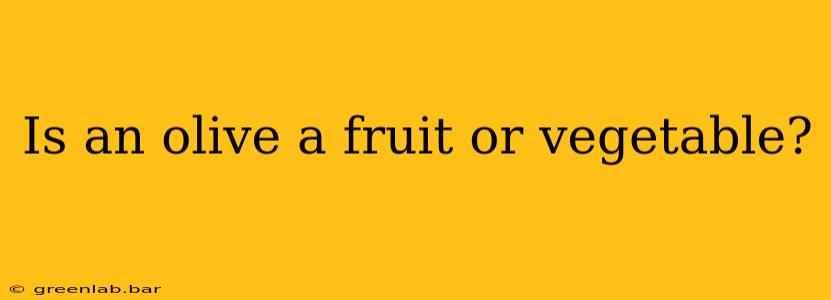The question of whether an olive is a fruit or a vegetable is a surprisingly common one, sparking debates among cooks, botanists, and anyone who's ever pondered the finer points of culinary classification. The answer, however, is surprisingly straightforward from a botanical perspective: an olive is a fruit.
Understanding the Botanical Definition of a Fruit
To understand why, we need to look at the botanical definition of a fruit. A fruit, in botanical terms, is the mature ovary of a flowering plant, containing seeds. This definition encompasses a much wider range of things than what we typically consider "fruit" in everyday conversation. Think tomatoes, cucumbers, and even things like squash and peppers – all botanically classified as fruits because they develop from the flower's ovary and contain seeds.
Why Olives Fit the Botanical Fruit Definition
Olive trees ( Olea europaea) are flowering plants. The olive itself develops from the flower's ovary after pollination and fertilization. Inside that fleshy olive, you'll find a hard pit containing the seed – the embryo of a future olive tree. This perfectly aligns with the botanical definition of a fruit.
The Culinary Confusion
The confusion often arises from how we use olives in our cuisine. We often think of fruits as sweet and vegetables as savory. Olives, while possessing a savory, often salty flavor profile, clearly fit the botanical description of a fruit. This highlights the difference between botanical classifications and culinary uses. Many "vegetables" we commonly consume are actually fruits botanically speaking.
Other "Fruits" We Treat as Vegetables
The olive isn't alone in this culinary-botanical mismatch. Consider these examples:
- Tomatoes: Botanically a fruit, but used culinarily as a vegetable.
- Cucumbers: Another botanical fruit frequently used as a vegetable.
- Squash: A botanical fruit, often used in savory dishes.
- Peppers (bell peppers, chili peppers): These are all fruits in the botanical sense.
The Bottom Line: Olives Are Fruits
In conclusion, while the culinary use of olives might lead us to categorize them as vegetables, botanically, an olive is undeniably a fruit. Understanding this distinction clarifies the often-blurred lines between botanical classification and culinary usage. So, the next time you enjoy a delicious olive, remember you're savoring a fruit—a savory, salty, and delicious fruit!

